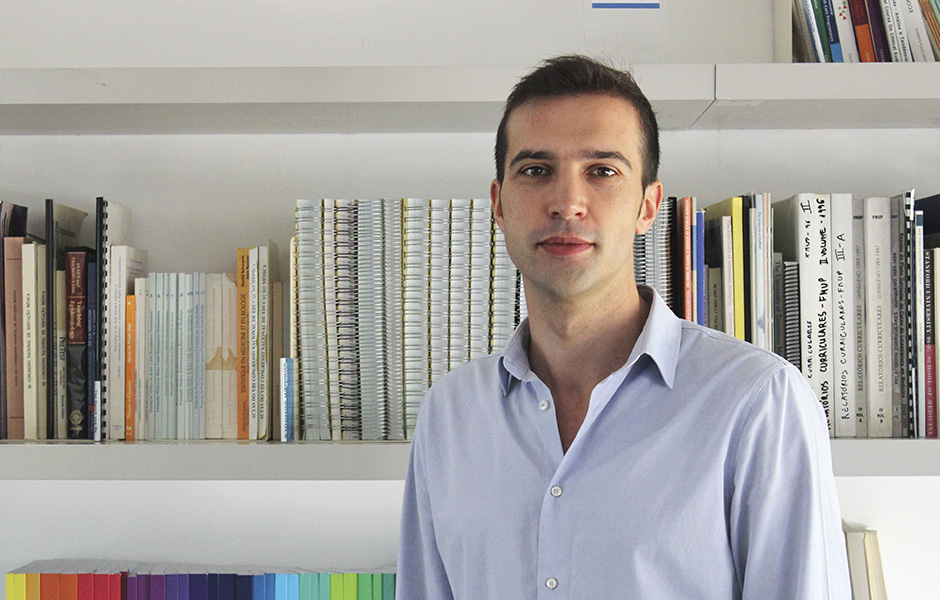Hernâni Gonçalves is 39 years-old, was born in Porto, is a mathematician, professor, amateur surfer and ex-scouter. He is also the principal investigator of SPA – Signal Processing Applications, one of the most recent research groups created in CINTESIS.
The researcher says that when he was young, he wanted to follow Electrotechnical Engineering, but Mathematics won his heart, much because of a professor he had whe he was in secondary school. He began to study Astronomy at the Faculty of Sciences of the University of Porto, but at the end of the first year he was able to switch to Mathematics Applied to Technology, at the same Faculty. He was a trainee and later a fellow of the CARDIOCRONOS project (FMUP, FCUP and FEUP), coordinated by João Bernardes and financed by the Portuguese Foundation for Science and Technology (FCT), having developed work in the area of signal processing and data analysis.
He completed a Master’s Degree in Computational Methods in Science and Engineering (FEUP / FCUP) in 2004, with a work on the analysis of fetal and animal heart rate for early identification of risk situations of fetal hypoxia. He was a researcher at the Center for Research in Geo-Spatial Sciences at FCUP, and completed his PhD in Geographical Engineering in 2010, with a thesis consisting of the automatic registration of satellite images.
In 2011, he returned to the Biomedical area as a postdoctoral fellow of the Faculty of Medicine of the University of Porto/CINTESIS, under the supervision of João Bernardes, Diogo Ayres de Campos and Altamiro da Costa Pereira. In 2017, he was hired as Guest Assistant Professor of the Department of Preventive Medicine, Health Information and Decision (MEDCIDS), and in 2019 he became a full-time Assistant Professor. He is also one of the persons responsible for the Winter School 2019 and a researcher of SisPorto, which is dedicated to the automatic analysis of cardiotocograms (simultaneous recording of fetal heart rate and uterine contractions).
As the principal investigator of SPA, he is dedicated to developing methodologies for the processing and analysis of biomedical signals that can serve as alternatives or complements to existing methods, particularly for monitoring heart rate and other physiological signals. “There are many technological changes, the new equipment allows other types of approaches and mathematically we can always improve and innovate,” says the researcher.
The SPA group brings together researchers from areas such as Applied Mathematics, Medicine, Geography and Environment, and is also engaged in the analysis of the relationship between spatio-temporal data, such as those obtained through satellite images, and people’s health. Good examples of this are two ongoing projects, one that studies the relationship between environmental factors and the occurrence of preterm delivery and preeclampsia, and another that aims to identify spatial and temporal patterns in the probability of occurrence of nosocomial infections, allowing the determination of zones of greater risk and the definition of preventive strategies.
1-Year Ambition
The ambition is to see SPA grow. We applied for funding so that we can have more critical mass and be able to respond to our own ideas and to challenges pose by other. The big challenge is to get the money to keep the current researchers and to “recruit” new researchers. There is also the possibility of providing services of signals analysis, like ECG or electromyography, to health institutions or in partnership with ongoing projects.
10-Year Ambition
10 years from now, the ambition is to fulfill the third objective of the group: to produce knowledge for preventive health and to contribute to the improvement of personalized diagnosis and treatment. Our ambition is not to limit what we do to scientific publications. We want our research to be useful to people. I think this must be the goal of a researcher: to produce knowledge that is useful to society.
Life Beyond Research
I enjoy spending time with my family and doing sports. I’ve been surfing for two years. I also like running and playing tennis. From time to time I pick up the guitar to play, I like it from the time I was a scout. I spent about 6 years in the Scouts (from explorer to pioneer).

